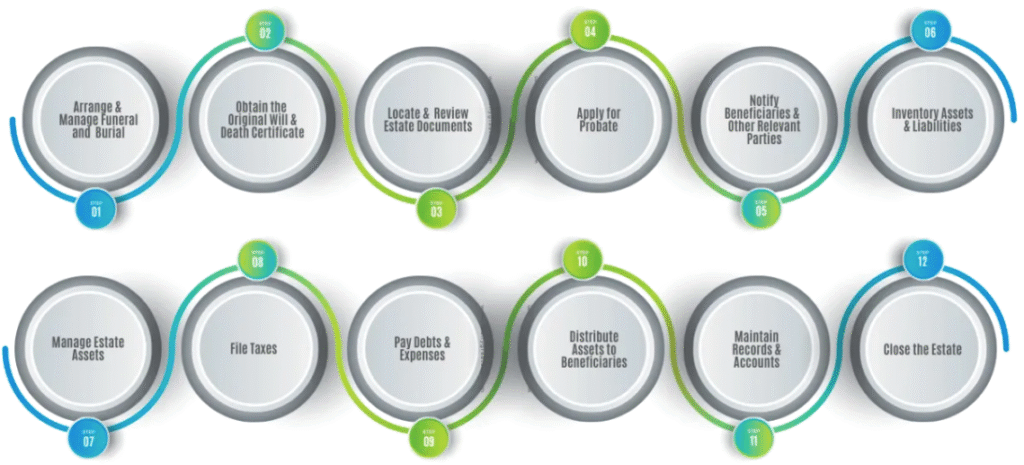ESTATE ADMINISTRATION
Guiding you through the process of closure and financial peace after a loved one passes
My loved one has just passed away.
What do I do now? Help . . .
We understand that losing a loved one is an incredibly difficult and overwhelming experience. You might feel lost and unsure of what steps to take next. During this time of grief, it’s important to have someone who can provide not just legal guidance, but also compassion and understanding.
As estate lawyers, our role goes beyond the legal aspects. We’re here to offer a guiding light through the complexities you’re facing. It’s not just about the tasks at hand, but about providing a sense of comfort and clarity in a time when everything seems uncertain.
You don’t have to navigate this path alone. We’re here to demystify the process, to hold your hand and gently lead you through each necessary step. Our aim is to help bring closure to this traumatic life event in a dignified and respectful manner.
From securing what’s important, to ensuring that your loved one’s wishes are honoured, every step will be taken care of with utmost sensitivity. This is a time for you to focus on healing and remembering, and we’ll be there to handle the complexities, shining a light on the path ahead, ensuring that everything is dealt with properly and with the respect your loved one deserves.
Remember, you’re not along on this journey. We’re here to support and guide you through each step, providing a steady presence in a time of turmoil.
Probate . . . .? What's that . . .?
Do I need to "Probate" the Estate?
You, the person who will be winding down the estate and dealing with things are the “estate trustee” for the estate.
Probate in Ontario refers to the legal process where the court formally recognizes your authority as the estate trustee to administer the estate and grants the authority formally by signing a court-sealed document for the estate trustee’s use.
This process is officially known as applying for a “Certificate of Appointment of Estate Trustee.” However, it is commonly referred to as probate.
Here’s a simpler breakdown of what this means:
- Validity and Authority – When someone passes away, the estate trustee’s authority needs to be proven as valid. Probate is the court’s way of saying, “This authority is legitimate, and the person applying as estate trustee has the right to handle this estate.”
- Estate Trustee’s Role – The estate trustee is responsible for gathering the deceased’s assets, paying off any debts, and distributing what’s left to the beneficiaries according to the will.

- Why Probate is Necessary – Probate gives the estate trustee legal authority to do things like sell property or access bank accounts. It also reassures institutions and people dealing with the estate trustee that they are authorized to manage the deceased’s affairs.
- Avoiding Probate – In some cases, peole plan their estate in ways to minimize the need for probate, like through joint ownership or designationg beneficiaries on certain accounts. This can make the process quicker and less costly for the estate.
- Cost and Time – Probate can involve fees based on the value of the estate and might take time, which can be important considerations in estate planning.
- Is Probate Always Required? – Not Always. Whether an estate goes through probate in Ontario depends on the nature and value of the assets and the requirements of institutions holding these assets. For example, if the deceased owned real estate solely in their name or had substantial bank accounts, probate is usually necessary. However, if the assets were jointly owned with a right of survivorship (like a home owned jointly by spouses), they might pass directly to the co-owner without needing probate.
In layman’s terms, think of probate as the legal stamp of approval for an estate trustee which enables them to go ahead and manage the deceased’s estate as outlined in the will or statute. It’s a step to ensure that everything is in order and the estate trustee’s actions are legally recognized.

